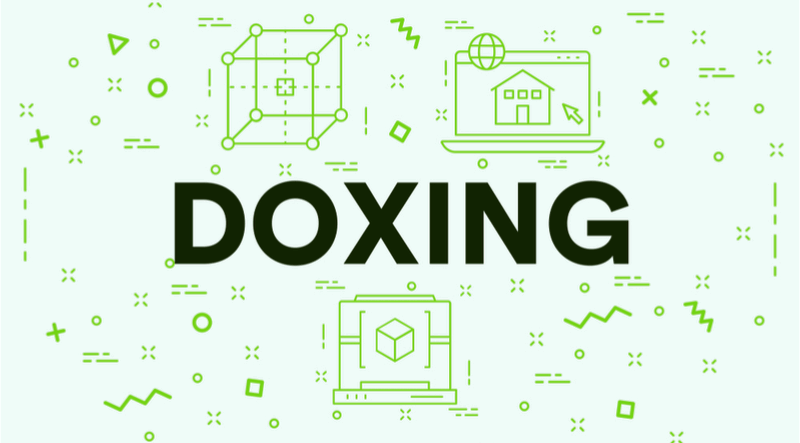British study published in June 2022 revealed that 19% of respondents were victims doxing (or else, Doxing), of a practice in which people with bad intentions post, usually at Internet, the personal details of their victims in order to embarrass or intimidate them.

I have nothing to hide!
And you might think, “So what? I have nothing to hide!” We tend to think of our life as less interesting than it is fancy life of a celebrity.
What we don't count on is that for someone who wants to bully us, that's not the point.
Many of us are already careful about protecting our essential information on social media. Details such as phone numbers or home addresses are often kept private. But what about all the other information?; The city we live in? The space work us; These are all facts that we willingly share with everyone.
Anyone can be a victim
The reason why doxing it's so dangerous it's because we are all potential victims.
In recent years doxing it has acquired a new purpose. Has been tool of social pressure, exposing what the perpetrator believes to be his victim's faults and the social damage he has caused.
In July 2022, a doctor in Austria who regularly gave interviews about the need to vaccinate against him Covid-19 he committed suicide due to constant bullying by people who believed the pandemic was a lie. Earlier, the doctor had met at her workplace with protesters who sent her threatening messages. The release of her personal information led to new threats even from people outside Austria.
In another case, a woman's phone number was published in a fake sex ad, as revenge for her professional opinion published in a local newspaper.
Also, a quick search of the news reveals people who have been victimized doxing after they wrote a bad review about a business. In such a case the identity of a woman revealed by her license plate in a video uploaded by someone who captured her in a moment of rage.
Younger generations at risk
The doxing is so prevalent and deeply rooted in the online world which can easily be confused with other types of online harassment.
The doxing for one simple disagreement or rivalry in an online video game it can be enough to create enormous emotional stress due to fear of consequences and shame, especially if children are involved.
Platforms like Twitch, the Steam, the Discord and Roblox they can give a false sense of security since most interactions occur between anonymous players. However, small details are enough for the determined doxers to dig up personal information, for example, by looking for a user ID on Twitter, where they can find more personal information and a list of friends.
But this does not only happen in Gaming. The virtual ones school resources based on video or social media platforms can also become dangerous if proper privacy rules are not implemented, both by schools as well as by them parents.
You can avoid falling victim doxing;
There is no easy way to answer this. After all, if there is no information about you online it will be very difficult for someone to find anything. But even if you're a typical internet user – and in case someone really wants to leak your personal information for whatever reason – chances are you've already shared enough information online.
Fortunately, there are ways you can prevent anyone from collecting information about you:
- Clean up your digital presence.
- Don't share (more) personal information online.
- Use authentication two factorial (or multifactorial) (2FA, MFA) across all your accounts.
- Use one strong and unique code.
- Make sure your conference calls and calls are private and encrypted.
- Do not open web links (left-wing) before making sure they were sent by someone you know. If in doubt, ask! If they are sent by someone you don't know, don't open them at all.
What to do if you become a victim doxing;
- First of all, do not blame yourself for the malicious intentions of others. Keep in mind that we are all at risk.
- Report and block the abuser through the tools available on the platform where the harassment is taking place.
- Keep records of all the details that may be relevant to support your case.
- Make sure all your social media accounts are private - consider putting them on hold for a while.
- Let your friends or family know what's going on, especially if your home or work address has been exposed.
- Let your bank know what's going on - make sure your credit card details are protected.
- Consider contacting the police. While doxing itself may not be a crime, the financial fraud and physical harm that results from it is.
The Internet of the future need not be dangerous
The doxing it is serious and can ruin your life, especially in a world where, despite the fact that we are all interconnected, we are increasingly divided in our opinions. The term comes from the abbreviation "docs" for "documents" and refers to the files that are leaked on the internet and contain the personal information of the victim. The disclosure of such personal information may in the future become a table tennis game where we will all be affected.
But this kind of sensitization on this particular subject is also what can protect us in the future.
Important ones are already underway discussions for his criminalization doxing, preventing its further development and creating a framework to protect victims.
Η realization that these attacks can happen to anyone and h attentive presence online is the best we can do for now.





